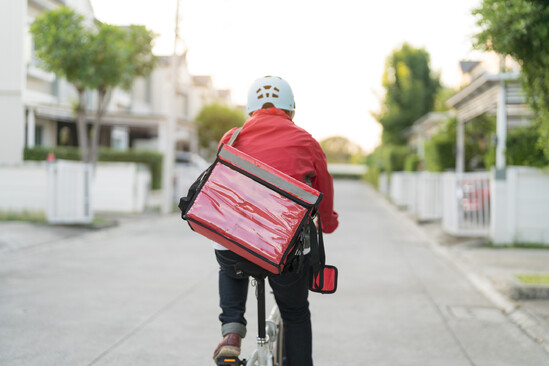
A minimum wage hike for about 60,000 food delivery drivers in NYC, set to go into effect this week, was put on hold when a judge ruled in favor of Uber, DoorDash and Grubhub, which had sued to stop the raise. The companies argued that the new rate — $17.96 an hour — would raise prices for customers and reduce work for drivers, many of whom make less than the current $15 an hour minimum wage. Nationwide, drivers have struggledto get better pay and benefits despite huge demand for their services.
- Drivers are “often at the margins of the labor market,” Urban Institute economist Kate Bahn tells Axios, with Cornell labor professor Andrew Wolf adding that in NYC especially, many are undocumented.
By Emma W. Thorne, Editor at LinkedIn News
DoorDash, UberEats, and Grubhub sue New York City over a new $18 an hour minimum wage for delivery drivers
- Uber, DoorDash, and Grubhub are suing New York City to block a new minimum wage law for delivery workers.
- Beginning on July 12, delivery apps must pay drivers about $18 per hour they are active on the app.
- While many drivers advocated for the change, some drivers say it will restrict their flexibility.
Uber, DoorDash, and Grubhub are suing New York City to block a new law they claim will impair the delivery economy.
Beginning July 12, delivery drivers in New York City must earn a minimum wage of about $18 an hour, according to a law signed by Eric Adams last month. While some advocacy groups applauded the ruling, the delivery apps argue that the workers, who are considered independent contractors, will be worse off.
Drivers currently earn a base pay for each trip plus a tip, which is selected by the customer. The new minimum wage would require delivery apps to either pay drivers roughly 50 cents per minute of every trip or pay drivers $17.96 per hour they are active on the app.
Setting this minimum could eliminate the flexibility of delivery jobs, which is one of the reasons many people rely on the gig, DoorDash stated in a letter to the Department of Consumer and Worker Protection, the agency tasked with setting the minimum wage.
And some drivers agree. Alberto Mendes has been a delivery worker for two decades and believes the law gives delivery companies more agency to determine workers’ schedules.
“They shouldn’t have done this,” Mendes told Insider. “Now they’ll make us work whenever they want. Even though we’re not employees, they’re going to schedule us.”
Mendes, who has worked for Grubhub and DoorDash for the last seven years, said the job isn’t what it used to be. “Now because there are more delivery drivers and people are ordering less and tipping less, it’s becoming more difficult. If they tell me when to work and when not to work, I think I’ll look for a new job,” he said.
Another driver who declined to give his name said he was concerned about “less flexibility.”
Olam, a delivery driver for Instacart and Grubhub who declined to give his last name, echoed that sentiment. “We’re independent contractors, so all those benefits and hourly wages takes away from the freedom,” he said.
Yet, many drivers pushed for the minimum wage, including the worker collective Los Deliveristas Unidos, who also advocated for recent laws that allow drivers to use restaurant restrooms and set delivery perimeters. One reason they advocate for higher wages is to cover the costs of gig work, such as vehicle repair, gas, tolls, and injuries. A 2022 report by the city found that delivery workers have high rates of injury while on the job.
“Any pay increase for workers is a good thing in my mind as it’s always been at the top of the list as far as driver concerns over the past ten years I’ve been covering the industry. Eighteen dollars per hour active time also seems reasonable for a high-cost-of-living city like New York. If gig companies were more transparent with their earnings data, I think we could give them more benefit of the doubt here, but for now, I would argue that couriers in New York City deserve a pay increase,” Harry Campbell, an advocate for gig drivers and the founder of “The Rideshare Guy” blog, told Insider:
The minimum wage law could also raise prices for customers, DoorDash said in a blog post. “Higher fees are coming for consumers, which will inevitably mean less revenue for local businesses and fewer earning opportunities for workers,” it read.
A DoorDash spokesperson provided Insider the following comment: “Bad policies cannot go unchallenged, and we will not stand by and let the harmful impacts of this earnings standard on New York City customers, merchants, and the delivery workers it was intended to support go unchecked.”
Grubhub and Uber did not immediately respond to Insider’s request for comment.
BY: Jennifer Ortakales Dawkins, Will Gendron, and Nancy Luna, INSIDER

